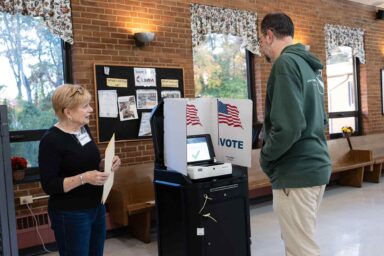Slew of Pre-Election Lawsuits Are Evidence of a Democracy in Decline
Many of the proposed or newly implemented changes to election laws in many states may result in chaos and confusion on Election Day — which could allow Trump to tell a second Big Lie and further undermine US democracy should he lose.
|
Listen To This Story
|
Now that the first Americans have cast their ballots, it would be fair to say that the 2024 election has officially begun. But that’s only half the story. Because, in reality, it has been underway for months now, and in the end, the outcome won’t depend just on who gets the most votes (or rather the most votes in the Electoral College) but also about who is on the ballots, which Americans get them, who can vote (and when), and how those votes are counted.
And that’s a battle that has been going on since Donald Trump tried to steal the last election.
It’s been waged in Congress, in state legislatures, in governors’ mansions, in the courts, and in the backrooms of party headquarters and political action committees.
Just in the past week, the US Supreme Court ruled that Green Party candidate Jill Stein will be left off the Nevada ballot.
The Arizona Supreme Court issued a decision this week that almost 98,000 registered voters whose citizenship documents have not been confirmed can cast a ballot in state and local races.
Different courts in different swing states have reached different decisions on whether Robert F. Kennedy Jr. must stay on their ballots after he suspended his campaign.
Georgia’s elections board voted to require a hand count of ballots and made it easier for local officials to help Trump with his next coup.
Trump and House Republicans threatened to shut down the government unless Congress passes a poorly disguised voter suppression law.
And in Nebraska, the GOP-led state legislature is considering a last-minute change designed to deprive Vice President Kamala Harris of a crucial Electoral College vote.
But those are just the most recent and public examples.
Since the 2020 election, voters in a majority of states face new restrictions. Not surprisingly, most of them were put in place in GOP-controlled states.
Conservatives have also led efforts to purge voter rolls. While standard voter roll maintenance is useful, some of these efforts seem designed to reduce the number of likely Democratic voters.
Democrats are not innocent. They are just trying to influence the election in different ways, for example by keeping third-party candidates off the ballot that could drain votes from Vice President Kamala Harris.
Of course, these are the same candidates that Republicans are trying to prop up.
Many of these changes may (or are even intended to) result in chaos and confusion on Election Day. This, in turn, will allow Trump to tell a second Big Lie and further undermine the US election system should he lose.
A lot of these problems are self-inflicted and can be blamed on a patchwork of election laws governed by states run by people more intent on maintaining power than fairly administering elections, the Supreme Court’s dismantling of the Voting Rights Act, and endless money in politics.
A lot of them could be fixed by passing the John Lewis Voting Rights Advancement Act and putting in place common-sense measures like universal voter registration.
Of course, that would require the support of the very same people who have very little interest in running fair and transparent elections.




